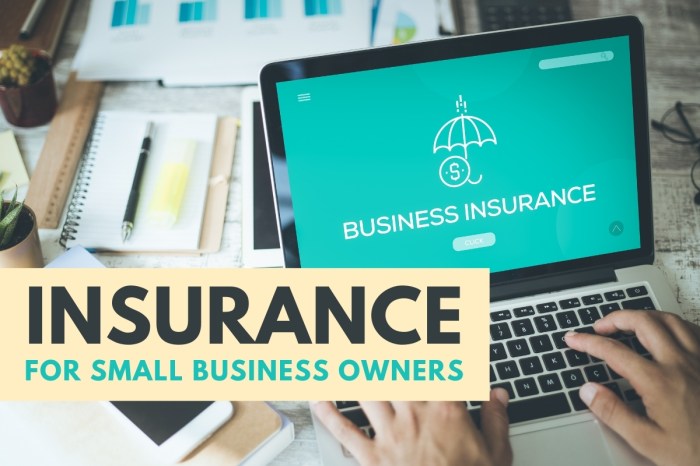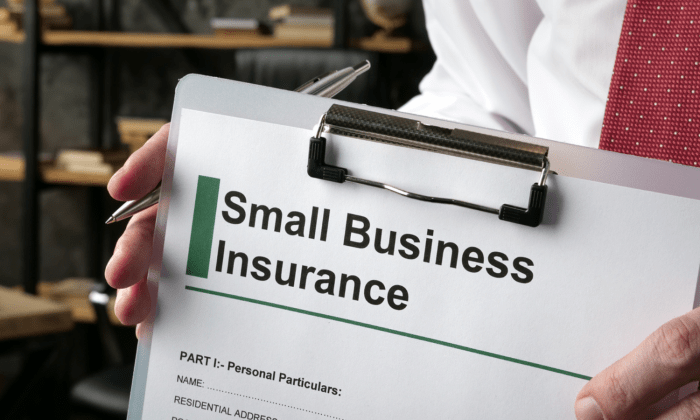What is the best insurance for small businesses? This question is on the minds of many entrepreneurs as they navigate the complexities of running a business. From unexpected accidents to legal disputes, there are numerous risks that can threaten the stability of a small business.
The right insurance policies can act as a safety net, protecting your assets and providing financial peace of mind.
This guide will explore the essential insurance policies for small businesses, delve into factors to consider when choosing coverage, and provide insights on managing insurance costs. We’ll also share valuable resources to help you find the right insurance solutions for your specific needs.
Types of Insurance for Small Businesses

Running a small business involves a lot of risk. You could be liable for injuries to customers or employees, or you could lose valuable property in a fire or natural disaster. That’s why it’s important to have the right insurance policies in place to protect your business.
There are many different types of insurance policies available for small businesses. The specific policies you need will depend on your industry, the size of your business, and your individual risk tolerance. However, there are some essential policies that most small businesses should consider.
General Liability Insurance
General liability insurance is a must-have for most small businesses. It protects you from financial losses if someone is injured or their property is damaged on your business premises or as a result of your business operations. For example, if a customer trips and falls in your store, general liability insurance would cover the cost of their medical bills and any legal expenses.
Property Insurance
Property insurance protects your business from financial losses due to damage or destruction of your property, such as your building, equipment, inventory, and furniture. This coverage can help you rebuild your business if it is damaged or destroyed by a fire, flood, or other disaster.
Workers’ Compensation Insurance
Workers’ compensation insurance is required in most states for businesses with employees. It provides benefits to employees who are injured or become ill as a result of their work. These benefits can include medical expenses, lost wages, and disability payments.
Business Interruption Insurance, What is the best insurance for small businesses?
Business interruption insurance helps you cover lost income if your business is forced to close temporarily due to a covered event, such as a fire, flood, or power outage. This coverage can help you pay your bills and keep your business afloat while you are unable to operate.
Professional Liability Insurance
Professional liability insurance, also known as errors and omissions (E&O) insurance, protects professionals from financial losses due to mistakes or negligence in their work. This type of insurance is important for businesses that provide professional services, such as accounting, legal, or consulting services.
Optional Insurance Policies
In addition to the essential policies listed above, there are a number of optional insurance policies that may be beneficial for specific industries. These policies can help you protect your business from a wider range of risks.
- Cyber Liability Insurance: Protects your business from financial losses due to data breaches, cyberattacks, and other cyber-related incidents.
- Product Liability Insurance: Protects your business from financial losses due to injuries or damages caused by your products.
- Employment Practices Liability Insurance: Protects your business from financial losses due to lawsuits related to employment practices, such as discrimination, harassment, or wrongful termination.
Managing Insurance Costs

Insurance premiums can be a significant expense for small businesses, but there are ways to minimize these costs without sacrificing essential coverage. Understanding your insurance needs and exploring various strategies can help you save money while ensuring your business is adequately protected.
Bundling Insurance Policies
Bundling insurance policies is a popular way to save money. By combining multiple policies, such as property, liability, and workers’ compensation, with the same insurance company, you can often qualify for discounts. This is because insurance companies often offer lower premiums for bundled policies, as they see you as a more valuable customer.
For example, if you bundle your business property insurance with your business liability insurance, you might receive a 10% discount on your premiums.
Risk Management Practices
Implementing strong risk management practices can also help reduce insurance costs. Insurance companies often reward businesses that demonstrate a commitment to safety and risk mitigation.
- Employee Training:Providing comprehensive safety training to your employees can help prevent accidents and injuries, reducing the likelihood of workers’ compensation claims.
- Regular Inspections:Conducting regular inspections of your business premises and equipment can identify potential hazards and allow you to address them before they lead to accidents or property damage.
- Security Measures:Implementing security measures, such as security cameras and alarm systems, can deter theft and vandalism, reducing the risk of property damage and liability claims.
Insurance Resources for Small Businesses

Finding the right insurance for your small business can be a bit overwhelming. You have a lot of options, and each one has its own nuances. Luckily, there are many resources available to help you navigate the process.
Government Resources
Government websites are a great place to start your research. They offer valuable information about insurance requirements and regulations, as well as resources for finding affordable coverage. Here are some key resources:
- Small Business Administration (SBA):The SBA provides a wealth of information about insurance for small businesses, including resources on choosing the right coverage and managing your insurance costs. You can find their website at https://www.sba.gov/ .
- Federal Trade Commission (FTC):The FTC provides information on insurance scams and how to protect yourself from fraudulent insurance practices. You can find their website at https://www.ftc.gov/ .
- State Insurance Departments:Each state has its own insurance department that regulates insurance companies and can help you resolve insurance disputes. You can find your state’s insurance department website by searching online.
Industry Associations
Industry associations can provide valuable insights into the insurance needs of your specific industry. They often offer resources, such as insurance guides and webinars, to help members navigate the insurance landscape. Here are a few examples:
- National Federation of Independent Business (NFIB):The NFIB is a leading advocate for small businesses and provides resources on a variety of topics, including insurance. You can find their website at https://www.nfib.com/ .
- U.S. Chamber of Commerce:The U.S. Chamber of Commerce offers resources on insurance for small businesses, including information on risk management and insurance planning. You can find their website at https://www.uschamber.com/ .
Insurance Broker Websites
Insurance brokers are independent professionals who can help you find the right insurance coverage for your business. Many brokers have websites that provide information about their services and the types of insurance they offer. Here are some tips for finding a qualified insurance broker:
- Look for a broker who specializes in small business insurance:Not all insurance brokers have the same expertise. Look for a broker who has experience working with small businesses and understands their unique insurance needs.
- Get referrals from other business owners:Ask other business owners who they use for insurance and what their experiences have been.
- Check the broker’s credentials:Make sure the broker is licensed and insured in your state.
- Get multiple quotes:Don’t settle for the first quote you receive. Get quotes from several different brokers to compare prices and coverage.
Conclusion

Navigating the world of small business insurance can seem overwhelming, but with the right information and resources, you can make informed decisions that protect your business. Remember to regularly review your insurance needs and adjust your coverage as your business evolves.
By taking proactive steps to safeguard your business, you can focus on achieving your entrepreneurial goals with greater confidence.
Query Resolution: What Is The Best Insurance For Small Businesses?
How much does small business insurance cost?
The cost of small business insurance varies depending on factors such as industry, location, size of business, and coverage options. It’s best to get quotes from multiple insurance providers to compare premiums and find the most affordable option.
Do I need a business insurance broker?
While you can purchase insurance directly from insurance companies, a broker can provide valuable assistance in finding the right coverage at competitive rates. They can help you navigate the complex world of insurance and ensure you have the appropriate protection for your business.
